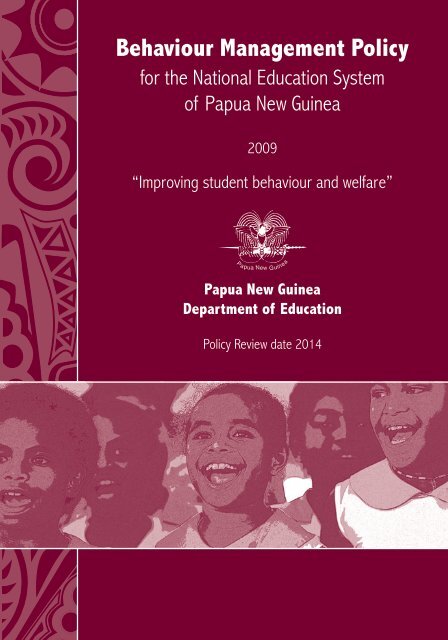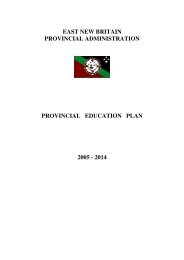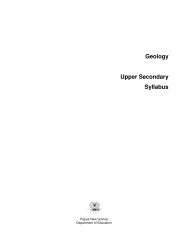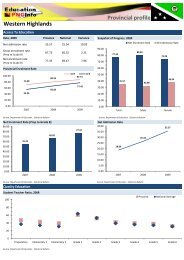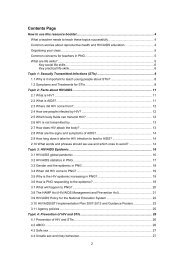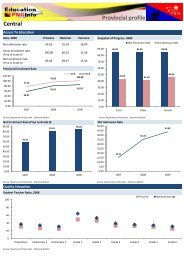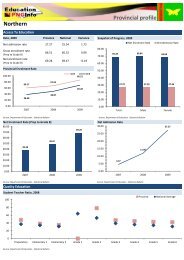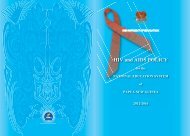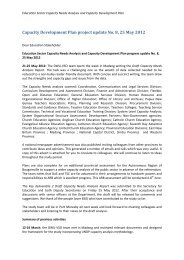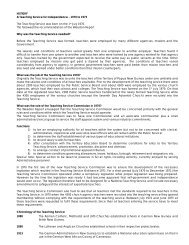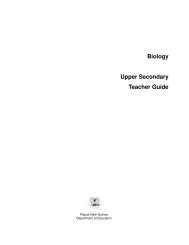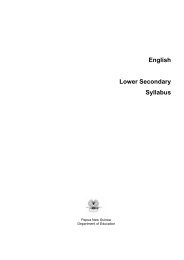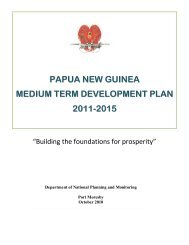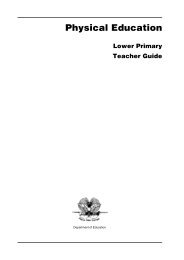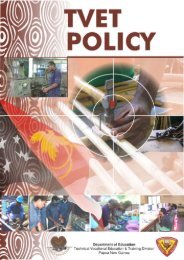Behaviour Management Policy - Department of Education
Behaviour Management Policy - Department of Education
Behaviour Management Policy - Department of Education
Create successful ePaper yourself
Turn your PDF publications into a flip-book with our unique Google optimized e-Paper software.
<strong>Behaviour</strong> <strong>Management</strong> <strong>Policy</strong>for the National <strong>Education</strong> System<strong>of</strong> Papua New Guinea2009“Improving student behaviour and welfare”Papua New Guinea<strong>Department</strong> <strong>of</strong> <strong>Education</strong><strong>Policy</strong> Review date 2014
<strong>Behaviour</strong> <strong>Management</strong> <strong>Policy</strong>for the National <strong>Education</strong> System<strong>of</strong> Papua New Guinea2009“Improving student behaviour and welfare”Papua New Guinea<strong>Department</strong> <strong>of</strong> <strong>Education</strong><strong>Policy</strong> Review date 2014
IntroductionThe <strong>Department</strong> <strong>of</strong> <strong>Education</strong> is determined to support schools to effectively managestudent behaviour. This policy provides the foundation for ways in which stakeholders canwork together to guide and improve student behaviour. It also sets out a framework to assistschools in resolving those student issues that require disciplinary actions.School behaviour management is more than just school rules, codes <strong>of</strong> conduct, punishmentsand counselling. It also involves effective classroom management, a safe workingenvironment, praise and rewards, clear communication, participation by all stakeholders, lifeskills training, sharing best practice, assertive discipline, good planning and well trained andwell supported pr<strong>of</strong>essional teachers. Effective behaviour management is a whole schoolapproach and reduces the potential for poor and antisocial behaviour to occur by developingthe social, emotional and behavioural skills <strong>of</strong> students.BackgroundThe PNG education reform has rapidly led to a large increase in student enrolment. Thecurriculum has changed to become more relevant and student centred. Cultural andsocial changes have also made additional demands on the education system. Schools andteachers have had to rise to the difficult challenge <strong>of</strong> these changes and the increasingdemand for quality education. The <strong>Department</strong> <strong>of</strong> <strong>Education</strong> has recognised the need tochange approaches and systems to meet the challenge <strong>of</strong> education and student behaviourmanagement in the 21st century.In November 2005, the <strong>Department</strong> <strong>of</strong> <strong>Education</strong> and AusAID commissioned research onbehaviour management. The Review <strong>of</strong> Student <strong>Behaviour</strong> and Counselling Requirements inPNG made a series <strong>of</strong> recommendations for improving support for schools and was endorsedfor implementation by the DoE in May 2007.The review identified social problems that affect students including drug and alcohol abuse,violence, sexual harassment and rape, unplanned pregnancies, pornography, cult activitiesand generation names, bullying, abuse <strong>of</strong> information technology (internet, mobile phones),and poor behaviour when travelling to and from school. Poor student-teacher communicationand poor teacher behaviour contribute to discipline problems and disruption in the school.However it is important to recognise that the majority <strong>of</strong> students and behave well and workhard.This policy is one strategy for changing the way schools manage and respond to studentbehaviour. Other activities are highlighted in the responsibilities for stakeholders, such asimproving and expanding the training <strong>of</strong> school based counsellors, improving the quality<strong>of</strong> teacher training in behaviour management, improving systems for teacher discipline,improving school management, improving school infrastructure and increasing communityparticipation.8 <strong>Behaviour</strong> <strong>Management</strong> <strong>Policy</strong> for the National <strong>Education</strong> System <strong>of</strong> Papua New Guinea
ConsultationThere has been wide consultation to develop this policy including a media campaign innewspapers and on radio, national consultation visits and forums, literature reviews,distribution <strong>of</strong> two draft copies and four regional editing workshops. Teachers, students andparents/guardians were the main focus <strong>of</strong> the initial consultation. National and internationalbest practices have been studied and the content and principles have been discussed with anextensive group <strong>of</strong> stakeholders, particularly students, parents/guardians and teachers.Guide to this policyThere is a supplementary document, <strong>Behaviour</strong> <strong>Management</strong>: a Guide for Schools to supportthis policy which provides guidance to teachers and schools on best practice in behaviourmanagement. This supplementary document provides information on behaviour managementstrategies, recommendations on discipline procedures, appropriate rewards and sanctions.<strong>Behaviour</strong> <strong>Management</strong>: a Guide for Schools also provides advice on how to respond tospecific problems and issues faced by schools.Who must follow this policy?This policy covers all government and church agency schools and educational institutionswithin the national education system. All students, teachers, head teachers and schoolmanagement (including boards <strong>of</strong> management, boards <strong>of</strong> governors and governing councils),school based counsellors and ancillary staff have a responsibility to follow this policy.This policy also applies to all education <strong>of</strong>ficers from both national and provincial levels,including the National <strong>Education</strong> Board (NEB), Provincial <strong>Education</strong> Boards (PEBs), educationadvisors, standards and guidance <strong>of</strong>ficers.<strong>Behaviour</strong> <strong>Management</strong> <strong>Policy</strong> for the National <strong>Education</strong> System <strong>of</strong> Papua New Guinea9
Furthermore, this policy recognises the vital roles played by different stakeholders in theschool community including parents/guardians, young people, churches, non-governmentalorganisations (NGOs), health services, welfare services and the police. These vitalpartnerships are to be established, maintained and encouraged.Permitted educational institutions are welcome to adopt the support document, <strong>Behaviour</strong><strong>Management</strong>: a Guide for Schools.What do we mean by ‘child’ and’student’?Children are under 18 years old. They are covered by special laws and internationalobligations such as the Juvenile Justice Act, Lukautim Pikinini Act and United Nations,Convention on the Rights <strong>of</strong> the Child.Students can be <strong>of</strong> any age as long as they are enrolled in an educational institution.Students older than 18 years have adult legal responsibilities but should be treatedaccordingly within the principles <strong>of</strong> this policy.It is important to note that children differ in their ability to make decisions at differentages. Whilst this policy applies generally to all students <strong>of</strong> all ages, please remember thatconsideration needs to be made for younger students or those students with special needswho may not be able to understand and realise the causes and consequences <strong>of</strong> their ownbehaviour.10<strong>Behaviour</strong> <strong>Management</strong> <strong>Policy</strong> for the National <strong>Education</strong> System <strong>of</strong> Papua New Guinea
Key terms<strong>Behaviour</strong><strong>Behaviour</strong> is the reactions and actions <strong>of</strong> an individual or group to other individuals orgroups <strong>of</strong> people, events, or the environment. Student behaviour refers to the sets <strong>of</strong>behaviours that would usually be seen in groups <strong>of</strong> young people at school. The behaviour <strong>of</strong>students is influenced by their age, peers, family, teachers, culture and gender. Examples <strong>of</strong>positive student behaviours include helping friends, studying hard, obeying school rules andorganising social activities. Examples <strong>of</strong> poor student behaviour include disruption in class,not completing work, poor punctuality and not listening to teachers. Anti-social behavioursare those behaviours that cause distress and harm to others and are unacceptable in society.Examples <strong>of</strong> anti-social behaviour include bullying, cult activities, drug and alcohol use, andgraffiti.School behaviour management<strong>Behaviour</strong> management is a whole school approach to promoting positive student behaviour.It is about creating an environment where students are valued and learn socially acceptableways <strong>of</strong> behaving. It includes a range <strong>of</strong> strategies for responding to poor behaviour,including effective discipline techniques, effective sanctions, fair suspension and expulsionprocesses, and counselling.It also includes strategies that encourage positive student behaviour such as ensuring a safe,supportive and healthy learning environment, effective class and school management andteaching <strong>of</strong> life skills.School behaviour management reduces the potential for poor and antisocial behaviour bydeveloping the social, emotional and behavioural skills <strong>of</strong> students through a wide range <strong>of</strong>strategies.DisciplineDiscipline comes from the word ‘disciple’ which means ‘to instruct’. School discipline isabout teaching children the rules <strong>of</strong> acceptable behaviour, and helping them to understandwhat is expected <strong>of</strong> them in their society. Effective discipline ensures there is a sense <strong>of</strong>order amongst students and school are safe places where learning can take place withoutinterference. School rules and behaviour management policies are part <strong>of</strong> discipline. Oftenwhen people talk about discipline, they really mean ‘punishment’ which is one method toenforce discipline by negative or harmful means.<strong>Behaviour</strong> <strong>Management</strong> <strong>Policy</strong> for the National <strong>Education</strong> System <strong>of</strong> Papua New Guinea11
PunishmentPunishment is when a negative and unpleasant consequence is given to an individual so thatthey will not repeat the same behaviour again. Punishments are <strong>of</strong>ten designed to make theindividual suffer. For example, calling children names to embarrass them in front <strong>of</strong> theirclassmates, forcing a student to go without food during their lunch or hitting a child. Oftenpunishments are ineffective and even harmful because they based using fear and discomfortas a strategy to control students and do not provide an opportunity for the student to learnalternative behaviour. Corporal punishment (using physical force against a student) is notpermitted by the <strong>Department</strong> <strong>of</strong> <strong>Education</strong>. In recognition <strong>of</strong> the issues around the use <strong>of</strong>punishment, this policy uses the term sanction rather than punishment to refer to measurestaken by schools to enforce a consequence for poor behaviour. <strong>Behaviour</strong> <strong>Management</strong>: aGuide for Schools provides further information about the use <strong>of</strong> sanctions.CounsellingCounselling is a process that helps people to cope with issues and reach decisions affectingtheir lives. It involves the counsellor talking with a person (client) in a way that helps thatperson explore their problems, understand the contributing factors and identify ways tochange or improve their behaviour, character, values or life circumstances. It does not involvegiving advice or making judgements.People usually seek counselling when they are experiencing distress, change or when therehas been a crisis. Counselling is always voluntary. You cannot force people to enter intocounselling.Sometimes, poor student behaviour is caused by problems or challenges that the youngperson is facing in their life. Counselling can help young persons to change their behaviourand better deal with their problems. In schools, counselling is provided by a school basedcounsellor who has been trained by the <strong>Department</strong> <strong>of</strong> <strong>Education</strong>.12 <strong>Behaviour</strong> <strong>Management</strong> <strong>Policy</strong> for the National <strong>Education</strong> System <strong>of</strong> Papua New Guinea
Who is responsible for implementing this policy?1. The responsibilities <strong>of</strong> studentsStudents are the most important stakeholders in maintaining good behaviour in schools.To help implement this policy students have a responsibility to:1.1 Behave well, respect others and follow school rules1.1.1 Behave well in school and follow the school rules in the school behaviourmanagement policy.1.1.2 Take responsibility for their own behaviour and learn from their mistakes.1.1.3 Say “no” to risky or illegal behaviours.1.1.4 Respect the learning and rights <strong>of</strong> others.1.1.5 Contribute to the writing and review <strong>of</strong> a school behaviour management policy.Understand the policy, its expectations and be guided by it.The <strong>Department</strong> <strong>of</strong> <strong>Education</strong> expects all students to:1. Do their best in school.2. Treat peers in a caring and friendly way regardless <strong>of</strong> their gender, sexuality,health, disability, religion, race or cultural background.3. Solve problems and conflicts in a peaceful way.4. Value school property and respect the properties <strong>of</strong> others.5. Cooperate with fellow students, teachers and school authorities.6. Actively contribute to decision making in the school and the StudentRepresentative Council.7. Try to be a good role model for others and encourage peers to behave well.8. Be honest.9. Report incidents <strong>of</strong> disruption, bullying, violence and any form <strong>of</strong> harassment.10. Ask for help if they need it and help others.11. Dress neatly in line with the school rules.12. Come to school (don’t truant) and attend lessons on time.<strong>Behaviour</strong> <strong>Management</strong> <strong>Policy</strong> for the National <strong>Education</strong> System <strong>of</strong> Papua New Guinea13
2. The responsibilities <strong>of</strong> parents and guardiansParents and guardians have a vital role to play in the education <strong>of</strong> their children and are thefirst teachers <strong>of</strong> good behaviour and positive values. Some behaviour problems in school arelinked to a student’s home life.To help implement this policy parents and guardians have the responsibility to:2.1 Raise children in a safe, healthy and caring home2.1.1 Provide food, water, clothing, shelter, love, support, security and discipline fortheir children.2.1.2 Raise children in a home free from violence, fear, drugs, alcohol and all forms<strong>of</strong> abuse.2.1.3 Provide education for their children.2.1.4 Provide a well organised home with time for work and play. There should be aplace for children to study.2.2 Build the foundations for good behaviour2.2.1 Be a good role model.2.2.2 Treat all children under their care equally.2.2.3 Value all children: praise and encourage their strengths and recognise theirgood behaviour.2.2.4 Teach acceptable behaviour in a non-violent, loving and consistent way.2.2.5 Help children set realistic goals.2.2.6 Help children to understand and appreciate key values. Teach them goodmorals, ethics and customs.2.3 Support education and behaviour management in schools2.3.1 Ensure the safety and good behaviour <strong>of</strong> their children to and from school.2.3.2 Meet regularly with their child’s teacher and discuss the child’s progress.14 <strong>Behaviour</strong> <strong>Management</strong> <strong>Policy</strong> for the National <strong>Education</strong> System <strong>of</strong> Papua New Guinea
2.3.3 Report academic, behavioural, health or family problems that affect the child atschool quickly to the teacher, school based counsellor or head teacher.2.3.4 Learn about the school policies and curriculum.2.3.5 Support the school in decisions about student behaviour and use properprocedures for appeal when there is disagreement about the decision.2.3.6 Contribute to the development <strong>of</strong> the school and be actively involved in schoolactivities such as parents & citizens (P&C) meetings and the school learningimprovement plan (SLIP).2.3.7 Contribute to the writing, implementation and review <strong>of</strong> the school behaviourmanagement policy.3. The responsibilities <strong>of</strong> communitiesCommunities form the wider environment for the development <strong>of</strong> the child. They also have animportant role to play in their local school. Children’s behaviour reflects the community theygrow up in and all community members have a responsibility to help young people grow to beresponsible citizens.To help implement this policy communities have the responsibility to:3.1 Build a safe and healthy environment for students3.1.1 Protect all children against all forms <strong>of</strong> violence and abuse, bullying, drugs andalcohol and exploitation.3.1.2 Protect all children, especially girls and young women, from sexual harassment,rape, incest and sexual exploitation.3.1.3 Help children to resist harmful peer pressure.3.1.4 Identify trustworthy and reliable people in the community that young peopleand children can go to if they need help or advice.3.1.5 Teach children the positive traditional values, cultures and customs which arebeneficial to their health, education and well being.<strong>Behaviour</strong> <strong>Management</strong> <strong>Policy</strong> for the National <strong>Education</strong> System <strong>of</strong> Papua New Guinea15
3.1.6 Establish and support programs and activities for young people. For example,sports, religious activities, scouts, girl guides, musical activities, peer educationand youth clubs.3.2 Support education and behaviour management in schools3.2.1 Ensure all children in the community go to school and value education equallyfor both boys and girls. Help disadvantaged children to go to school.3.2.2 Respect the decision <strong>of</strong> the school when dealing with unacceptable studentbehaviour.3.2.3 Encourage a culture <strong>of</strong> respect for the school and discourage vandalism, theft,and other destructive behaviour.3.3.4 Select school board members wisely and have equal participation <strong>of</strong> men andwomen.3.3.5 Support the teaching <strong>of</strong> the subject titled ‘personal development’.3.3.6 Participate in P&C meetings and other school activities such as the SLIP.4. The responsibilities <strong>of</strong> teachersTeachers have a duty <strong>of</strong> care to all students. They must establish an effective, safe, calm andproductive learning environment. A well-prepared, knowledgeable, skilful and caring teacherwill have a well-behaved and well-managed class. Every teacher is responsible for managingstudent behaviour in their school.To help implement this policy teachers have the responsibility to:4.1 Be a good role model for behaviour4.1.1 Follow the PNGTA Teacher Code <strong>of</strong> Ethics. Teachers who are not a member <strong>of</strong>PNGTA can still use the PNGTA Teacher Code <strong>of</strong> Ethics as a guide to ethicalteacher behaviour.4.1.2 Treat all students equally and fairly regardless <strong>of</strong> their gender, sexuality, health,disability, religion, race or cultural background.4.1.3 Respect the rights <strong>of</strong> all students and other members <strong>of</strong> the school community.16 <strong>Behaviour</strong> <strong>Management</strong> <strong>Policy</strong> for the National <strong>Education</strong> System <strong>of</strong> Papua New Guinea
4.1.4 Listen to students and give them the opportunity to contribute meaningfully inschool activities.4.1.5 Promote positive, honest and caring relationships within the school.4.1.6 Be punctual and do not leave their class unsupervised.4.2 Pr<strong>of</strong>essionally manage student behaviour4.2.1 Plan and use a range <strong>of</strong> positive and effective behaviour management strategies.4.2.2 Be fair, prompt, calm and consistent when dealing with student misbehaviour.Teachers must not use any form <strong>of</strong> violence or corporal punishment. Sanctionsshould never deliberately cause physical, emotional or mental harm to students.4.2.3 Communicate honestly and effectively with parents and guardians about theirstudent’s learning and behaviour. Plan and prepare regular student-teacherparent/guardianconferences.4.2.4 Build the self esteem <strong>of</strong> students by recognising, valuing and developing all theskills and talents <strong>of</strong> students.4.2.5 Support positive extra-curricular activities, peer education or studentleadership programs in the school.4.3 Protect children4.3.1 Encourage and refer students to counselling.4.3.2 Safeguard confidential information unless someone is at risk.4.3.3 Immediately report to the Director <strong>of</strong> Child Protection or his/her delegatedauthority, if the teacher has reason to believe a child is in need <strong>of</strong> protection.Teachers may inform their head teacher but the teacher has a legal duty toreport.4.4 Share best practice4.4.1 Plan and teach student-centred lessons which are motivating and challenging.4.4.2 Work as a team with fellow teachers to write and implement a school behaviourmanagement policy.<strong>Behaviour</strong> <strong>Management</strong> <strong>Policy</strong> for the National <strong>Education</strong> System <strong>of</strong> Papua New Guinea17
4.4.3 Keep accurate and proper written records <strong>of</strong> student behaviour issues andprovide regular updates to school management, and parents and guardians.4.4.4 Improve their teaching and behaviour management skills through pr<strong>of</strong>essionaldevelopment.5. The responsibilities <strong>of</strong> school based counsellorsA school based counsellor is trained and certified by DoE to counsel and provide guidanceto students in the school. Counselling and guidance are positive behaviour managementstrategies. There should be at least one male and one female school based counsellor in everysecondary school and one school based counsellor in every large primary school.To help implement this policy school based counsellors have the responsibility to:5.1 Be an ethical and effective school based counsellor5.1.1 Follow the DoE School Based Counsellor Code <strong>of</strong> Ethics.5.1.2 Be a positive role model: neutral, non-judgemental and supportive.5.1.3 Keep counselling sessions confidential unless a person is at risk to themselvesor others or if they provide consent for you to share information from thesession.5.1.4 Refer students to other supporting services if necessary.5.1.5 Assist the school to organise student leadership training, peer educationprograms and other relevant activities to improve and manage studentbehaviour.5.1.6 Report regularly to the provincial guidance <strong>of</strong>ficer and seek advice if necessary.5.1.7 Immediately report to the Director <strong>of</strong> Child Protection or his/her delegatedauthority, if the counsellor has reason to believe a child is in need <strong>of</strong>protection. Counsellors may inform their head teacher but the counsellor has alegal duty to report.5.2 Share best practice and learning about counselling5.2.1 Advocate for the importance <strong>of</strong> counselling and guidance as strategies <strong>of</strong>behaviour management.18 <strong>Behaviour</strong> <strong>Management</strong> <strong>Policy</strong> for the National <strong>Education</strong> System <strong>of</strong> Papua New Guinea
5.2.2 Advise the school administration on student behaviour. The school basedcounsellor must not be involved in disciplinary decision-making.5.2.3 Contribute to the writing and review <strong>of</strong> a school’s behaviour managementpolicy.5.2.4 Organise pr<strong>of</strong>essional development for teachers on basic counselling skills,child protection and behaviour management strategies.5.2.5 Continue to learn more about behaviour management and counsellingpractices. Share best practices with other pr<strong>of</strong>essional colleagues.6. The responsibilities <strong>of</strong> the head teacherA well managed and well led school is a school with fewer behaviour problems. The headteacher manages and leads the school to create an effective, safe and caring environment forlearning.To help implement this policy head teachers have the responsibility to:6.1 Manage a safe, healthy and well-behaved school6.1.1 Be a role model for good behaviour.6.1.2 Manage the school effectively, honestly and fairly.6.1.3 Ensure the school is a safe, clean, well supervised and healthy environment.Make sure classes are supervised when teachers are absent.6.1.4 Ensure sanctions never deliberately cause physical, emotional or mental harm tostudents. Violence and corporal punishment are never to be used.6.1.5 Inform the police, chairperson <strong>of</strong> the school board and provincial <strong>of</strong>ficersimmediately if serious criminal <strong>of</strong>fences are committed by students. Takeadministrative action to remove students or prevent them from attending classesif there is a clear and serious danger to people or property.6.1.6 Immediately report suspensions and potential expulsions to the school boardor to the Chair <strong>of</strong> the Discipline Committee if the board has delegated it’sauthority to this committee. Expulsions must be approved by the school board.6.1.7 Ensure parents/guardians and senior staff are informed promptly in seriousdiscipline cases.<strong>Behaviour</strong> <strong>Management</strong> <strong>Policy</strong> for the National <strong>Education</strong> System <strong>of</strong> Papua New Guinea19
6.1.8 Immediately report to the Director <strong>of</strong> Child Protection or his/her delegatedauthority, if the head teacher has reason to believe a child is in need <strong>of</strong> protection.6.1.9 Ensure teachers are familiar with processes <strong>of</strong> mandatory reporting <strong>of</strong> childrenin need <strong>of</strong> special protection.6.2 Implement a school behaviour management policy6.2.1 Work with school board, parents/guardians, students and teachers to develop aschool behaviour management policy which follows this policy.6.2.2 Implement, manage and monitor the school behaviour management policy andenforce fair, consistent and transparent rules with appropriate sanctions formisbehaviour. Respond promptly to behaviour issues.6.2.3 Work with teachers to help students improve their behaviour and make betterchoices. Ensure all teachers follow the school behaviour management policy.6.2.4 Regularly report on behaviour issues to the school board.6.2.5 Include student behaviour and welfare in the SLIP.6.3 Building capacity in behaviour management6.3.1 Ensure regular training for teachers on school behaviour managementstrategies.6.3.2 Organise the training <strong>of</strong> the school board on this policy.6.3.3 Improve their own behaviour management skills through pr<strong>of</strong>essional development.6.4 Providing counselling and support for students6.4.1 Ensure any school based counsellors have adequate time and a suitable placeto meet with students. School based counsellors may require a reduced teachingload.20 <strong>Behaviour</strong> <strong>Management</strong> <strong>Policy</strong> for the National <strong>Education</strong> System <strong>of</strong> Papua New Guinea
6.5 Improving teaching and learning <strong>of</strong> life skills6.5.1 Ensure the effective teaching <strong>of</strong> life skills in personal development and otherrelevant subjects.6.6 Build a strong stakeholder network6.6.1 Participate in and support P&C meetings.6.6.2 Make links with external support services such as, guidance <strong>of</strong>ficers, juvenilejustice working groups, lukautim pikinini councils, child protection services,approved NGO groups, churches, police and health services.7. The responsibilities <strong>of</strong> the school boardThe school board is the body that governs the management <strong>of</strong> the school or institution andhas a vital role in improving the school. It could be a board <strong>of</strong> management or board <strong>of</strong>governors or governing council.Under the current <strong>Education</strong> Act, 1983 and provincial education acts that are in force, theschool board is responsible for making school rules and decisions about expulsion andsuspension. This policy states that all stakeholders must be involved in making school rules.To help implement this policy school boards have the responsibility to:7.1 Support a safe, healthy and well-behaved school7.1.1 Make sure that all students and teachers work in a safe, healthy and peacefulenvironment with adequate resources for learning.7.1.2 Create a peaceful, effective working relationship between the school and theparents/guardians and community regarding student behaviour.7.1.3 Appoint male and female school based counsellors, if applicable.7.2 Develop and supervise a school behaviour management policy7.2.1 Write and regularly review the school’s behaviour management policy andensure it is in line with this policy.<strong>Behaviour</strong> <strong>Management</strong> <strong>Policy</strong> for the National <strong>Education</strong> System <strong>of</strong> Papua New Guinea21
7.2.2 Ensure students, parents, guardians and teachers are involved in the writing<strong>of</strong> the school’s behaviour management policy and that every stakeholderunderstands the purpose and procedures.7.2.3 Approve the school’s behaviour management policy and arrange for review bythe school’s standards <strong>of</strong>ficer as part <strong>of</strong> the SLIP.7.2.4 Support and supervise the implementation <strong>of</strong> the school’s behaviourmanagement policy.7.3 Decide carefully on student expulsions7.3.1 Ensure all students have the opportunity for learning. Expulsion is the lastresort and is to be used only for serious <strong>of</strong>fences. It can also be used forrepeated disruptive behaviour when counselling and other sanctions andstrategies have been exhausted.7.3.2 Ensure students are not expelled for pregnancy.7.3.3 Delegate disciplinary powers to suspend students for a stated length <strong>of</strong> time tothe head teacher, who must immediately report any suspension to the chair <strong>of</strong>the school board or the chair <strong>of</strong> the discipline committee.7.3.4 Delegate disciplinary powers to a school board disciplinary committee, ifnecessary. The school board or its delegated committee makes decisions onexpulsions.7.3.5 Ensure equal representation <strong>of</strong> men and women on the school board ordisciplinary committee for making decisions about student expulsion. The boardmust also ensure any members <strong>of</strong> the board who have conflicts <strong>of</strong> interestswithdraw for expulsion decisions.7.3.6 Give a fair, detailed, prompt and impartial hearing to students and parents/guardians in cases <strong>of</strong> expulsion.7.3.7 Ensure all concerned parties have a fair opportunity to represent themselveswhen the board meets to discuss a possible expulsion. The student concernedcan ask for an observer to accompany them during the meeting.7.3.8 Keep an accurate written record <strong>of</strong> expulsion decisions made by the board andimmediately report these to the Provincial <strong>Education</strong> Board and the ProvincialDisciplinary Appeals Committee.22 <strong>Behaviour</strong> <strong>Management</strong> <strong>Policy</strong> for the National <strong>Education</strong> System <strong>of</strong> Papua New Guinea
8. The responsibilities <strong>of</strong> church agenciesMany schools have aims which reflect the philosophy <strong>of</strong> their founding church agency. Theseagencies have an important role to play in supporting schools to improve student behaviour.Students who learn values such as compassion, empathy, non-violence and personalresponsibility will be better behaved.To help implement this policy, church agencies have the responsibility to:8.1 Support positive behaviour management practices8.1.1 Support their agency schools to develop their own school behaviourmanagement policies based on the rights and responsibilities in this policy andthe philosophy <strong>of</strong> the agency.8.1.2 Promote positive and non-violent approaches to behaviour management inagency schools, including counselling and the banning <strong>of</strong> corporal punishment.8.1.3 Ensure expulsion is used only as a last resort in agency schools and that theexpulsion and appeals process conforms with this policy.8.2 Work in partnership8.2.1 Work in partnership with standards and guidance <strong>of</strong>ficers to manage andimprove student behaviour in schools.8.2.2 Work in partnership with DoE to train church agency <strong>of</strong>ficers in behaviourmanagement, guidance and counselling strategies.8.3 Promote best practice on teaching and counselling8.3.1 Ensure school based counsellors in agency schools have successfullycompleted a DoE approved training course.8.3.2 Ensure high quality teaching <strong>of</strong> religious education in their agency schoolswhich develops life skills, good values and positive self esteem in all students.8.3.3 Contribute to the development and review <strong>of</strong> this policy and other schoolbehaviour management initiatives.<strong>Behaviour</strong> <strong>Management</strong> <strong>Policy</strong> for the National <strong>Education</strong> System <strong>of</strong> Papua New Guinea23
9. The responsibilities <strong>of</strong> the Provincial <strong>Education</strong> BoardThe PEB has an important role to play in student discipline and expulsion appeals. Theirresponsibilities are listed in the relevant education acts.It is recommended that the PEB delegate these powers to effective local committees toensure effective expulsion appeal decisions for the good <strong>of</strong> the student and the school. Forexample, by creating district expulsion appeals committees. The expulsion appeals committeeis the final arbiter on appeals against expulsion <strong>of</strong> students. Delegation <strong>of</strong> powers is at thediscretion <strong>of</strong> the PEB and the PEB will still be accountable for decisions made by any localcommittees.To help implement this policy the PEB (or its delegated committee) has the responsibility to:9.1 Ensure effective expulsion appeals9.1.1 Ensure that expulsion appeals are conducted promptly, fairly and transparentlyand that all parties can be represented.9.1.2 Ensure that expulsion appeals committees can be quickly convened after a writtenappeal is received by the chairperson <strong>of</strong> the PEB or their delegated authority.It is strongly recommended appeals are decided within 15 working days <strong>of</strong> thereceipt <strong>of</strong> the written appeal by the PEA or their delegated committee. Studentswill be reinstated automatically (with conditions set by the school, if necessary) ifthe expulsion appeals committee fails to meet within 15 working days.9.1.3 Ensure there is representation <strong>of</strong> both men and women on the expulsionappeals committee.9.1.4 Ensure fair and transparent procedures and membership criteria for theexpulsion appeals committee are developed and regularly reviewed. Theseprocedures should be in line with this policy.9.1.5 Ensure the committee only considers expulsion appeal cases. The expulsionappeals committee can:• Uphold the expulsion• Uphold the appeal and reinstate the student without further sanction orconditions• Uphold the appeal and reinstate the student with conditions and sanctions.9.1.6 Keep written records <strong>of</strong> expulsion appeals.24 <strong>Behaviour</strong> <strong>Management</strong> <strong>Policy</strong> for the National <strong>Education</strong> System <strong>of</strong> Papua New Guinea
9.2 Support schools to improve their behaviour management9.2.1 Supporting the in-service plans <strong>of</strong> schools to improve student behaviourthrough, for example, funding in-service coordinators.9.2.2 Monitor the implementation <strong>of</strong> this policy by recording and reporting on thenumbers <strong>of</strong> schools with an approved school behaviour management policy asreported by standards <strong>of</strong>ficers.10. The responsibilities <strong>of</strong> standards <strong>of</strong>ficers and TVETinspectorsStandards <strong>of</strong>ficers and TVET inspectors regularly visit schools to monitor the performance <strong>of</strong>schools.To help implement this policy standards <strong>of</strong>ficers and TVET inspectors have a responsibility to:10.1 Monitor how school’s improve behaviour10.1.1 Review the school’s behaviour management policy and check it is in line withthis policy. Advise schools on policy best practice and improving their policy.10.1.2 Report on the number <strong>of</strong> schools with approved policies to the PEB andnational education system as required.10.1.3 Work in partnership with guidance <strong>of</strong>ficers.10.2 Support schools to improve student’s behaviour10.2.1 Support schools to include student behaviour management in their SLIP andteacher in-service plan (TIP).10.2.2 Immediately report neglectful management practices, inadequate facilitiesor any other factors that will impact on student’s welfare and behaviour torelevant provincial and national education authorities.10.2.3 Charge teachers who breach this policy. For example, using corporalpunishment on a student.10.2.4 Raise awareness <strong>of</strong> this policy.10.2.5 When necessary, support schools in crisis management.<strong>Behaviour</strong> <strong>Management</strong> <strong>Policy</strong> for the National <strong>Education</strong> System <strong>of</strong> Papua New Guinea25
10.3 Protect children10.3.1 Immediately report to the Director <strong>of</strong> Child Protection or his/her delegatedauthority, if the <strong>of</strong>ficer has reason to believe a child is in need <strong>of</strong> protection.10.3.2 Support training <strong>of</strong> staff within schools on mandatory reporting and childprotection.10.3.3 Support the guidance <strong>of</strong>ficer and school based counsellor to design anddevelop child protection programmes for children within the school.11. The responsibilities <strong>of</strong> guidance <strong>of</strong>ficersGuidance <strong>of</strong>ficers have a wide range <strong>of</strong> responsibilities within their province. Their primaryrole is to build the capacity <strong>of</strong> schools to deal with student behaviour, counselling andguidance issues. They do this through advice, school visits, in-service, monitoring andevaluation. Guidance <strong>of</strong>ficers also train, mentor, assess and supervise school basedcounsellors.To help implement this policy guidance <strong>of</strong>ficers have the responsibility to:11.1 Monitor the implementation <strong>of</strong> the policy11.1.1 Work in partnership with standards <strong>of</strong>ficers and TVET inspectors to ensurethat this policy is implemented by all education institutions.11.1.2 Raise awareness on this policy and the changes this brings for schools.11.1.3 Collect data and information on school behaviour management issuesand report to Guidance Branch and PEB if necessary. Include policyimplementation in their quarterly report.11.2 Share best practice and build capacity11.2.1 Provide high quality training, supervision and support for teachers who wantto become school based counsellors.11.2.2 Train and support school based counsellors, teachers, head teachers andstandards <strong>of</strong>ficers in behaviour management strategies including assertivediscipline and student leadership training.26 <strong>Behaviour</strong> <strong>Management</strong> <strong>Policy</strong> for the National <strong>Education</strong> System <strong>of</strong> Papua New Guinea
11.2.3 Work with external support services such as juvenile justice working groups,lukautim pikinini councils, child protection services, relevant NGO groups,churches, police and health services.11.3 Protect children and support schools11.3.1 Follow best practice and the DoE School Based Counsellor Code <strong>of</strong> Ethics.11.3.2 Provide counselling services upon referral from schools.11.3.3 Provide, pr<strong>of</strong>essional and objective advice on disciplinary action whenrequested.11.3.4 When necessary, support schools in crisis management.11.3.5 Support the training <strong>of</strong> staff within schools on mandatory reporting andchild protection.11.3.6 Support school based counsellors with the design and development <strong>of</strong> childprotection programmes for children.11.3.7 Immediately report to the Director <strong>of</strong> Child Protection, or his/her delegatedauthority, if the <strong>of</strong>ficer has reason to believe a child is in need <strong>of</strong> protection.12. The responsibilities <strong>of</strong> the <strong>Department</strong> <strong>of</strong> <strong>Education</strong>There are key divisions within the DoE that have specific responsibilities for implementing thispolicy.12.1 Standards & Guidance DivisionTo help implement this policy the Standards and Guidance Division will:12.1.1 Lead development, review and implementation <strong>of</strong> this policy.12.1.2 Plan and implement strategies to improve guidance and counselling servicesin schools.12.1.3 Support, train and resource guidance <strong>of</strong>ficers to provide training inbehaviour management, child protection and school based counselling.12.1.4 Develop and distribute new student behaviour management, guidance andcounselling materials and training resources.<strong>Behaviour</strong> <strong>Management</strong> <strong>Policy</strong> for the National <strong>Education</strong> System <strong>of</strong> Papua New Guinea27
12.1.5 Conduct research on student welfare and behaviour issues.12.1.6 Make recommendations to the Top <strong>Management</strong> Team on matters affectingstudent behaviour.12.1.7 Recruit and deploy guidance <strong>of</strong>ficers to effectively and equitably cover allProvinces in Papua New Guinea.12.1.8 Train and prepare standards <strong>of</strong>ficers to include behaviour managementissues in SLIP.12.1.9 Work in partnership with Teacher <strong>Education</strong> Division and other trainingproviders to improve the training <strong>of</strong> teachers in student behaviourmanagement, guidance and counselling.12.2 Teacher <strong>Education</strong> DivisionTo help implement this policy Teacher <strong>Education</strong> Division will:12.2.1 Review and improve teacher and head teacher training in behaviourmanagement, inclusive education, child protection, guidance and counselling.12.2.2 Include this policy in all relevant teacher training programs.12.2.3 Work in partnership with Standards and Guidance Division to developteacher training materials in behaviour management, guidance andcounselling.12.3 Curriculum Development & Assessment Division:To help implement this policy Curriculum Development & Assessment Division will:12.3.1 Work in partnership with Teacher <strong>Education</strong> Division and Standards andGuidance Division to include this policy in relevant curriculum areas andmaterials development.12.3.2 Work with the Church <strong>Education</strong> Council to help improve the planning,teaching and assessment <strong>of</strong> religious education.12.3.3 Develop, trial and distribute materials to support the teaching <strong>of</strong> personaldevelopment, life skills and peer education.28 <strong>Behaviour</strong> <strong>Management</strong> <strong>Policy</strong> for the National <strong>Education</strong> System <strong>of</strong> Papua New Guinea
12.4 <strong>Policy</strong>, Planning and Research Division:To help implement this policy, the <strong>Policy</strong>, Planning and Research Division will:12.4.1 Work alongside the Standards and Guidance Division to monitor theimplementation <strong>of</strong> this policy.12.4.2 Work alongside and support the Guidance Branch to initiate, conduct anddisseminate research into behaviour management issues.12.4.3 Collect student behaviour management information in the school census.For example, recording the number <strong>of</strong> schools with their own behaviourmanagement policies and recording information on expulsions.12.4.4 Ensure student welfare is prioritised and adequately funded in the National<strong>Education</strong> Plan and in provincial education plans.12.4.5 Review the <strong>Education</strong> Act in light <strong>of</strong> recent national and internationallegislation, lessons learnt from the education reform and best practice inbehaviour management.12.5 Special <strong>Education</strong> UnitTo help implement this policy the Special <strong>Education</strong> Unit will:12.5.1 Ensure that all schools have a copy <strong>of</strong> the Special <strong>Education</strong> <strong>Policy</strong> (1993,revised 2004).12.5.2 Regularly review and update the Special <strong>Education</strong> <strong>Policy</strong> to reflectinternational standards and best practice in inclusive education.12.5.3 Work in partnership with Teacher <strong>Education</strong> Division and other trainingproviders to improve the training <strong>of</strong> teachers, and other education <strong>of</strong>ficersin inclusive education.12.5.4 Work in partnership with Standards and Guidance Division to improveschool’s capacity to include children with special needs in education.<strong>Behaviour</strong> <strong>Management</strong> <strong>Policy</strong> for the National <strong>Education</strong> System <strong>of</strong> Papua New Guinea29
13. The responsibilities <strong>of</strong> the Teaching Service CommissionThis policy makes a link between good pr<strong>of</strong>essional teachers and well behaved students.The Teaching Services Commission (TSC) has an important role to play in improving theperformance <strong>of</strong> teachers.To help implement this policy the TSC has a responsibility to:13.1 Enable improvement in teaching and counselling in schools13.1.1 Deal immediately and firmly with teachers who behave unpr<strong>of</strong>essionally,unethically or who harm their students.13.1.2 Work in partnership with PNGTA and other stakeholders to develop anddistribute an updated and binding code <strong>of</strong> ethics for all teachers.13.1.3 Create and adequately fund school based counsellor positions.13.1.4 Review the TSC Act in light <strong>of</strong> recent national and international legislation,lessons learnt from the education reform and best practice.14. The responsibilities <strong>of</strong> the National <strong>Education</strong> BoardIt is recommended that the National <strong>Education</strong> Board (NEB) discusses the delegation <strong>of</strong>its power to hear and determine appeals in cases where a governing body <strong>of</strong> a nationalinstitution expels a student. It is recommended that this power is delegated to a provincial orlocal appeals committee to improve effectiveness and speed <strong>of</strong> appeal processes.30 <strong>Behaviour</strong> <strong>Management</strong> <strong>Policy</strong> for the National <strong>Education</strong> System <strong>of</strong> Papua New Guinea
Sections <strong>of</strong> a school behaviour managementpolicyThe school’s behaviour management policy must be developed in consultation with students,teachers, parents, guardians and other relevant stakeholders before approval by the schoolboard and should follow the principles and responsibilities <strong>of</strong> this policy.A school behaviour management policy must have the following sections. Schools are freeto have additional sections if required. Sample school behaviour management policies areincluded in <strong>Behaviour</strong> <strong>Management</strong>: a Guide for Schools.1. Vision <strong>of</strong> the school(This can be taken from the SLIP)2. Aim <strong>of</strong> the school behaviour management policy3. Responsibilities <strong>of</strong> students(Written in student centred language)4. Responsibilities <strong>of</strong> teachers5. Partnerships with parents/guardians6. School rules (or code <strong>of</strong> conduct)7. <strong>Behaviour</strong> management procedures (including expulsion)• Strategies and consequences• Flow chart <strong>of</strong> possible actions• List <strong>of</strong> acceptable sanctions8. Who was consulted on the policy?9. Review date <strong>of</strong> the policy<strong>Behaviour</strong> <strong>Management</strong> <strong>Policy</strong> for the National <strong>Education</strong> System <strong>of</strong> Papua New Guinea31
The laws and acts that support this policyThis policy builds on and replaces the earlier Ministerial <strong>Policy</strong> Statement 3/2000 andSecretary’s Circular 52/2000The policy lays out the operational behaviour management responsibilities <strong>of</strong> teachers,schools and other elements <strong>of</strong> the national education system based on national laws,international obligations and DoE procedures.International obligations1. United Nation Convention on the Rights <strong>of</strong> the Child (1989; signed by PNG in1993)• Article 28 which is the right to education.• Article 29 which is the right to an education which tries to develop your personalityand abilities as much as possible and encourages you to respect other people’srights and values and to respect the environment.• Article 19 which is the right to be protected from being hurt or badly treated.• Article 37 which is the right not be punished in a cruel or hurtful way.• In this document ‘children’ refers to anyone under the age <strong>of</strong> 18.National laws1. <strong>Education</strong> Act, 1983 (Consolidated to No. 13 <strong>of</strong> 1995)This policy makes one operational additions to the <strong>Education</strong> Act, 1983:• The school board remains responsible for setting school rules but must now do thisthrough consultation with parents, guardians, students and teachers.2. Teaching Service Commission Act, 1998 (Consolidated to No. 20 <strong>of</strong> 1995)• Relevant sections that relate to teacher behaviour and child protection.3. Lukautim Pikinini Act (2009) for children under the age <strong>of</strong> 18Key points:• Child protection laws and child protection teams and <strong>of</strong>ficers.• It is a duty <strong>of</strong> a parent or guardian to provide education and guidance to their child.32 <strong>Behaviour</strong> <strong>Management</strong> <strong>Policy</strong> for the National <strong>Education</strong> System <strong>of</strong> Papua New Guinea
• It is unlawful to subject a child to social or customary practices that harm a child’swell being.• No child should be employed in any activity if it harms their education.• Children with disabilities have equal right to education.• The Pikinini Care Fund can provide education for children under the care <strong>of</strong> theDirector for Child Protection.• Teachers and head teachers have a duty to immediately inform the Director <strong>of</strong>Child Protection or his/her delegated authority if they believe a child is in need <strong>of</strong>protection.• A person convicted <strong>of</strong> a child-related criminal <strong>of</strong>fence is never allowed to work withchildren.4. Juvenile Justice Act (2005) for children under 18 years oldThere are strong similarities between the principles and strategies <strong>of</strong> the DoE <strong>Behaviour</strong><strong>Management</strong> <strong>Policy</strong> and the Juvenile Justice Act (2005).Key points:• Subject to reasonable conditions, juveniles in correctional institutions can attendschool and training.• Diversion should be considered rather than giving a criminal record. One possibleresponse to juvenile crime is compulsory school attendance and any other diversionoption must not interfere with the juvenile’s schooling.• When sentencing juveniles, educators can be asked for their input.• There is a list <strong>of</strong> serious <strong>of</strong>fences which may lead to remand in a CorrectionalServices Centre. Detention is the last resort.• No corporal punishment is to be used.5. Relevant criminal law including Summary <strong>of</strong> Offences Act• Particularly laws on drugs, rape, sexual assault, serious violence, serious theft,dangerous weapons, child abuse, threats and other serious <strong>of</strong>fences.<strong>Behaviour</strong> <strong>Management</strong> <strong>Policy</strong> for the National <strong>Education</strong> System <strong>of</strong> Papua New Guinea33
<strong>Department</strong>al policies and guidance1. PNG Teachers Association Code <strong>of</strong> Ethics, 2002• The standards <strong>of</strong> behaviour for teachers in PNG2. DoE HIV/AIDS <strong>Policy</strong> for the National <strong>Education</strong> System <strong>of</strong> PNG, 2005• Provision <strong>of</strong> counselling services in schools and protection from stigma anddiscrimination.3. Gender Equity in <strong>Education</strong> <strong>Policy</strong> 2002• All schools should treat boys and girls, men and women equally and fairly so theycan reach their potential.4. Special <strong>Education</strong> <strong>Policy</strong> (1993, revised 2004)• Provision <strong>of</strong> education within the National <strong>Education</strong> System for children with specialneeds, including those children with disabilities.5. National <strong>Education</strong> Plan 2005-2014• In line with UN Medium Term Development Goals on Universal Primary <strong>Education</strong>(UPE) 2005 – 14• Training and appoint <strong>of</strong> school based counsellors• Parental participation in schools34 <strong>Behaviour</strong> <strong>Management</strong> <strong>Policy</strong> for the National <strong>Education</strong> System <strong>of</strong> Papua New Guinea
Glossary and acronymsChildDoENEBP&CPEAPEBPNGTASchool boardSLIPSRCStandards <strong>of</strong>ficerTruantTIPTSCTVET inspectorsUNAnyone under the age <strong>of</strong> 18 years old<strong>Department</strong> <strong>of</strong> <strong>Education</strong>National <strong>Education</strong> BoardParents and Citizens groupProvincial <strong>Education</strong> AdviserProvincial <strong>Education</strong> BoardPapua New Guinea Teaching AssociationGeneral term for a board <strong>of</strong> management or board <strong>of</strong> governors orgoverning councilSchool Learning Improvement PlanStudent Representative CouncilA national education <strong>of</strong>ficer who inspects elementary, primary andsecondary schoolsWhen students decide not to go to class without a good reason andwithout parent/guardian knowledge.Teaching In-Service PlanTeaching Service CommissionA national education <strong>of</strong>ficer who inspects vocational centresUnited Nations<strong>Behaviour</strong> <strong>Management</strong> <strong>Policy</strong> for the National <strong>Education</strong> System <strong>of</strong> Papua New Guinea35
<strong>Policy</strong> developmentDeveloped by Guidance Branch, Standards & Guidance Division, DoE1st draft released for consultation 27th June 20082nd draft released for consultation 6th November 2008Final draft complete 6th May 2009If you would like additional copies <strong>of</strong> this policy or the Guidance document, pleasecontact:DirectorGuidance BranchPO Box 446WaiganiNCD(p) 325 7555 ext 488(f) 325 3963<strong>Policy</strong> review date201436 <strong>Behaviour</strong> <strong>Management</strong> <strong>Policy</strong> for the National <strong>Education</strong> System <strong>of</strong> Papua New Guinea


